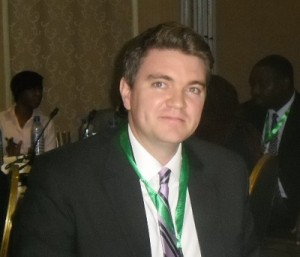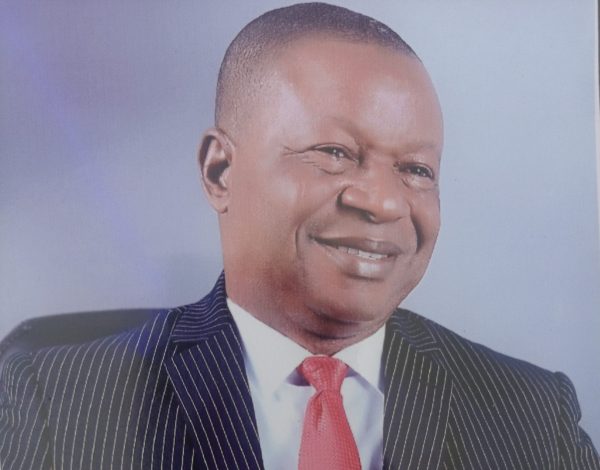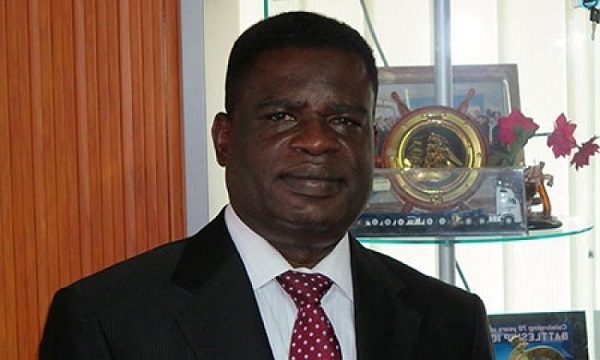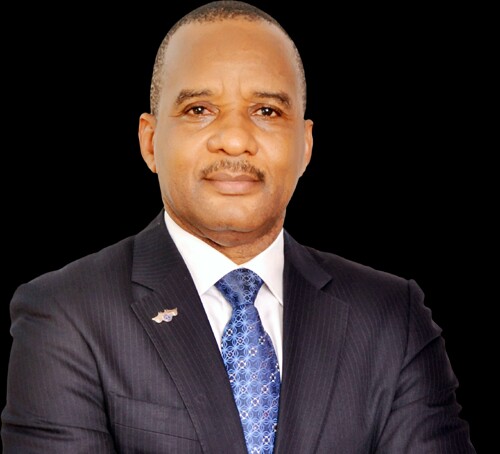How Shipowners Can Source Financing For Ships Without Collateral- Bergman

Mr. Neale Bergman is the Legal Officer of Unidroit, the international institute for the unification of private law, an independent intergovernmental organization, he came all the way from Rome to bring good news to Nigerian ship owners on the possibility of the actualization of the Cabotage Act through the acquisition of the right kind of vessel. In this exclusive interview with Ifeoma Oguamanam of MMS Plus, Neale explains how the Cape Town Convention helped Arik Air in Nigeria acquire new aircrafts and how the convention is working out modalities to extend its protocols to cover the maritime industry.
Read on.
What is the Cape Town Convention all about?
The Cape Town Convention is the product of the international institute for the unification of private law, it was originally set up in 1926, it is an auxiliary association of the League of Nations, sometimes people think it is a part of the united nations (UN) but it actually existed before the UN as a part of the League of Nations, which did not work out well from history but the institute survived and was reestablish in 1940 as UNIDRIOT, an independent organization that works for the harmonization of law.That is what we do till today.
How is member ship selected?
Membership is restricted to states that have keyed into the UNIDROIT statute and currently there are 63 member states including four Africa states and of course, we would love to have more African membership and participation. Egypt joined us in 1951, Nigeria in 1954, South Africa in 1974 Tunisia in 1980. So we engage in law harmonization projects, we have participates from all the regions of the world although our organization is predominantly filled with European nations and hopefully, we will be able to expand our membership in Africa, in the future.
Can you throw more light on your organization and operations?
UNIDROIT is structured with its secretariat in Rome, that is responsible for carrying out our work program on deliberations which is established every three years, we are also led by a secretary General with a 9-man member on his team and as a small organization, there is only 20 of us, we have a Governing Council which is 25 members elected by member states, typically judges, laws professors and esteemed individuals that make policy decisions. After that we have our General Assembly which is made up of one representative from each member state that forms the decision making organ.
It decides our budget and what we work on. Our work program includes legislative activities, non legislative activities, implementations and promotional activities. In legislative activities we work on a variety of areas where ever we feel there is need, member states steer us in the direction for legal harmonization projects. We work with the UNIDROIT commercial international promotion contracts, we are becoming known in the area of secure transactions and financing, as with the creation of the Cape Town Convention system.
Legislative activities for working methods are what we need to know before we engage in a project, that there is a need for that project, so we need to undertake feasibility study to gather information and that is part of the reason why I am here.
For the creation of conventions it is important that we have government full participation in the issue of government control of stakeholders, to ensure that it is something that is worthwhile because if we do not have the support of business participation, we can draft the convention and take all the time to do that but unless business owners are going to use it, it has not met its goals and purpose. So invariably when we create a convention and with suggestions coming in through the secretariat there will be initial study performance which is provided by the Governing Council and the Governing Council will decide whether or not to establish a study group to produce a draft of the convention.
The draft, if produced and is acceptable to the Governing Council, it then establishes its community of governmental experts and that community of governmental experts will review the convention and provide the facts to the Governing Council which will authorize and ultimately take over the conference. And all throughout the process we will have engagements with governments, observers and industry stakeholders.
For our non-legislative activities, we have a very large library for research and for any of you who are affiliated with universities, we will certainly encourage them to come and be part of UNIDROIT internship program , it is part of the ways we lets word out about what we do and we also have our implementation and promotional activities.
How many conventions has UNIDRIOT Created?
Over the 90 years of our history we have created quite a few conventions , we have to do a lot of work in creating these conventions, some of our conventions are listed and as well as some of the UNIDROIT laws and principles. The convention on international interests in mobile equipment, which is the Cape Town Convention, was signed at a conference hosted by South Africa in November 2001.
The Cape Town Convention seeks to address the traditional approach to financing that is covered by the law where the item is, the first type of assets that was covered were air planes because as soon as the airplanes leaves the jurisdiction which it is financed in, it becomes a question of how do I get my airplane back home from another country, what kind of law is going to apply and am I supposed to hire a lawyer to define every single law of jurisdiction or not.
The Cape Town Convention has tried to address the problem of legal system that vary in their approach to security interest and the process for the enforcement of those interests, it boils down to something more straight forward, if not treated it creates uncertainty for creditors and banks and that uncertainty results in higher risk and higher cost for people seeking credit and seeking to finance the purchase of large assets like aircraft, railway cars, ships etc. So the general purpose of the Cape Town Convention is to encourage financing and to reduce the cost, by introducing a sound legal structure for the creation and enforcement of security interest.
How does this convention actually work?
How the Cape Town Convention actually works, is that the parties for the transaction have entered into a security agreement or a leasing agreement that relates to one of these types of assets that the Cape Town Convention actually covers, that equipment is uniquely identifiable with a unique serial number, the agreement has to meet with formalities of the convention and the data representing the financing is located in the contracting state at the time of the conclusion of the agreement.
What are the laws of this agreement?
That is in the conflict of law analysis which states that a foreign state is the contracting state and the data is situated in that state, and in a transaction or otherwise under the convention even in a non contracting state, the data situated in a contracting state, in the case of a conflict of laws in that other state will lead to the application of the contracting state’s laws.
The creation of international trade allows that in drafting regular business practices, the agreement creating interest has to be writing, and the name of the object to be identified with a serial number as a unique feature, in the case of security agreement it enables the securing country to be the determinant.
So the nature of the international feature created under the Cape Town Convention is a very unique one , it is a switch to an exceptional interest and it is not derived from or dependent upon the domestic laws of a country, so one of the most important things is that it creates an international registry and so the aircraft protocol for example, there is a company that has been hired to be the registrar and it is created with the assistance and supervisory authority establishing the convention, so when you go on line you can see who has registered aircraft assets on that registry easily, it is stream lined and totally automated.
How successful has this convention been?
The registry authorizes the first in time first in right system so it eliminates excuse about knowledge about who registered and who did not, who has first in time has the priority when it comes to default situation. The convention is successful for two reasons, it is very flexible and it applies to particular principles, then it is flexible in the sense that we can now create protocols to extend this system to other types of equipment. So that is why we have an aircraft protocol, rail protocol. The most successful being the aircraft protocol.
It is also flexible, in the sense that, the system of declaration establishing the convention, which gives contract in faith flexibility to prioritize certain aspect that they think, will better conform to their local laws. Technically another reason why the Cape Town Convention has been a great success is the huge involvement from the private sector, so participation began from the very start, during the feasibility studies, negotiation and promotions. So, it started in 2001 and has move quickly, it already has 68 contracting states of which 21 are African states , so you can see UNIDROIT only has membership of 4 African states which is a number we hope to increase in the future.
Of course, we are doing much better because we have 21 African states signed up to the Cape Town Convention, for those states that are already part of the system it makes the transition to other types of assets in the future with additional protocol a bit easier. As with the aircraft protocol, there are 59 contracting states of which 15 states are Africans states. So Africa is part of the success of the convention and I mentioned the lobbying of government and other international institutions for promotion and implementation.
Another benefit under the aircraft protocol is something that potentially could happen in the maritime situation is that there was a negotiation of reduction in rate of export credit, so export credit has become 10% cheaper on certain aspects of the Cape Town Convention on aircraft.
The Governing Council of UNIDROIT, in 2013 considered on what protocols to work on next and it was proposed that three protocols should be worked on; one relating to agricultural equipment, mining equipment and construction equipment and others relating directly to ship and maritime transport equipment and the third to offshore wind generation equipment.
In that consideration, they looked at the study that was done in 2013 and the study has a citation that anyone can have access to because we are looking forward to feedback on that study. The study covers ship and maritime equipment and they are considered from the very beginning of the creation of the Cape Town Convention.
The study found that, however, at that time and we are talking about between 1996 and 1999, there was concerns that UNIDROIT was trying to take over other International Maritime Organization mandate (IMO), when we were actually looking at very specific secure transaction and financing issues, UNIDROIT is not trying to become the International Maritime Organization, we are probably , less than a 10th of that organization, besides those issues in 2013, they came back and saw what a success the aircraft protocol was and they have come and are now considering whether or not to move forward with the maritime protocol.
What are the limitations considered in the maritime protocol?
So that 2013 study identified and considered the main legal obstacles in the financing regime that exists, whether or not the market practice has found alternative solution which will suggest that the maritime protocol is necessary and would it be a success, and lastly whether the extension of the Cape Town convention system will be suitable. So that was the main legal obstacles. Also the study basically found that there was varying approaches to secure interest in cross jurisdiction and it was, infact, creating uncertainty in a couple of ways.
Different countries have different registry and some countries have multiple registry which is unclear to creditors how that will be dealt with in the different jurisdictions and the different priority arrangement, whether someone had priority of first in time or whether they had priority because they need more money. Those are the different aspects.
So the 2013 study having observed the legal obstacles, considered the alternative solution in market practices and they stated that the use of the law of the flag have not been a successful alternative because when you make a law of the flag, an ownership company might not be thinking about secure transactions or financing , they will be thinking about a whole range of issues which includes , labor laws , health laws and different things that apply and not just financing. So what has happened is that, the alternative solution is, if you are seeking to enforce a secure interest, if you are a creditor you will have to take that boat around the ocean until it falls within the jurisdiction that is favorable to you.
So for suitability and flexibility the IMO will serve as the registrar for the maritime protocol, to ensure that the performance is running smoothly as they seem to be very well placed to serve that role and function.
So, right now we are monitoring developments in this sector to see if indeed there is a need for this protocol, although we have gone beyond the initial study which has been sent to the Governing Council and the secretariat and also sent to stakeholders, so we need the ship owners and private sector to show us there is a need and interest for this and protocol and we will consider whether or not to move forward.








